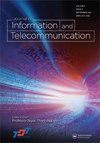Variable-bandwidth recursive-filter design employing cascaded stability-guaranteed 2nd-order sections using coefficient transformations
IF 2.7
Q2 COMPUTER SCIENCE, INFORMATION SYSTEMS
Journal of Information and Telecommunication
Pub Date : 2023-10-14
DOI:10.1080/24751839.2023.2267890
引用次数: 0
Abstract
This paper shows a 2-step procedure for obtaining a variable-bandwidth recursive digital filter whose structure contains cascaded second-order (2nd-order) sections. Such a cascade-form structure is insensitive to the round-off noises that come from filter-coefficient quantizations in hardware implementations. This paper also shows how to utilize a 2-step procedure to get a variable-bandwidth recursive filter that is absolutely stable. The first step (Step-1) of the 2-step procedure designs a series of constant-bandwidth filters for approximating a series of evenly discretized variable specifications, and the second step (Step-2) fits the coefficient values obtained from Step-1 by employing individual polynomials. To ensure the stability of the resultant constant-bandwidth filters in Step-1, coefficient transformations are first executed on the 2nd-order transfer function's denominator-coefficients, and then each coefficient of both numerator and transformed denominator is found as an individual polynomial. Once all the polynomials are obtained, the polynomials corresponding to the transformed denominator are further converted to composite functions for ensuring the stability. Hence, the 2-step procedure not only produces a cascade-form variable-bandwidth filter that has low quantization errors, but also ensures the stability. A lowpass example is included for verifying the achieved stability and showing the high approximation accuracy.采用系数变换的级联稳定保证二阶分段的变带宽递归滤波器设计
本文给出了一个包含级联二阶段的变带宽递归数字滤波器的两步法。这种级联结构对硬件实现中滤波系数量化产生的舍入噪声不敏感。本文还展示了如何利用一个两步法得到一个绝对稳定的变带宽递归滤波器。两步过程的第一步(step -1)设计了一系列恒定带宽滤波器来近似一系列均匀离散的变量规格,第二步(step -2)通过使用单个多项式来拟合从步骤1中得到的系数值。为了保证步骤1中所得到的等带宽滤波器的稳定性,首先对二阶传递函数的分母系数进行系数变换,然后将分子和变换后的分母的每个系数都作为一个单独的多项式找到。一旦得到所有的多项式,将变换后的分母对应的多项式进一步转换为复合函数,以保证稳定性。因此,两步过程不仅产生了级联形式的可变带宽滤波器,具有低量化误差,而且保证了稳定性。通过一个低通实例验证了所获得的稳定性和较高的逼近精度。
本文章由计算机程序翻译,如有差异,请以英文原文为准。
求助全文
约1分钟内获得全文
求助全文
来源期刊
CiteScore
7.50
自引率
0.00%
发文量
18
审稿时长
27 weeks

 求助内容:
求助内容: 应助结果提醒方式:
应助结果提醒方式:


